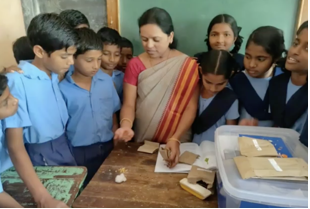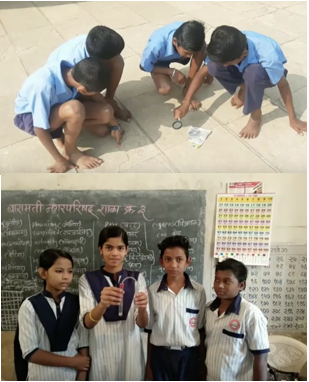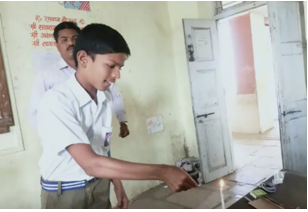E2S/NBG Experiential Learning for Village Schoolchildren
- 4,050 STUDENTS
- 9 SCHOOLS
- 450 STUDENTS PER SCHOOL
- $2.50 COST PER SCHOOL
- $1.10 COST PER STUDENT
- 500 KITS
- 20 TEACHERS
Editor’s Note: In this article, we refer to classrooms and labs for students involved in the experiential learning program we’re working on with our NGO partner Gujarat Vidyapith. While the current coronavirus pandemic has made classroom learning impossible, the concepts discussed hold true.
But concepts are abstract. The real world calls for action, and we’ve answered that call.
As the coronavirus took hold, we adjusted our support, which enabled Gujarat Vidyapith to identify and act on a solution to fit with the world’s current challenges.
As you’ll read below, the heart of this program is students learning by doing, in other words: experiential learning. Beginning April 26, students will be using kits and newly created online videos of the experiments so they can follow along. They’ll also have live teacher interactions.
Extending the Reach: Over the 60 days following the release of videos in Gujarati, additional versions will be made available for Hindi, Marathi, Bengali, and English, with the objective of serving remote, rural India.
Internet Access: While the most recent data tells us that only 41% of the population of India (560 million) has internet access, Gujarat Vidyapith estimates that more than 80% of the students they’re working with have the tools necessary to utilize their program (which will run on any device), and they’re doing what they can to grow that number. We’ll keep you posted.
We hope you’ll take the time to read about this important and amazing program.
Share & Care has a long, passionate history of promoting education as a means to uplift underprivileged children of India by cultivating a lifelong passion for learning.
Through our signature Educate 2 Success (E2S) program, we have provided hundreds of students at risk of failing or dropping out of school with the opportunity to grow up and thrive as productive, compassionate, and confident members of society.
Gujarat Vidyapith and the NBG System of Experiential Learning

As part of our 2020 goals, we are striving to reach 4,050 students across nine village schools in Gujarat through a program designed to create an educational pathway to current — and future — job markets for secondary and high school students. Working with NGO Gujarat Vidyapith, the program — Experiential Science & Technology Learning for Village Schoolchildren — brings experiential learning into rural village classrooms by utilizing the NBG (Narmada Bal Ghar) System of Experiential Learning.
“The best teacher today is experiential learning. We need to give students the platform to learn in unique methods, breaking the boundaries of classrooms.”
—Dr. Monica Khanna, Director and Professor of Marketing,
K J Somaiya Institute of Management Studies & Research,
Mumbai, India [Source]

Share & Care chose to work with Gujarat Vidyapith because they are changing the way children and teachers approach the future. Founded in 1920 by Mahatma Gandhi (the same year he launched his Non-Cooperation Movement), Gujarat Vidyapith is dedicated to a nursery-to-doctorate integrated system of education to address the need for rural upliftment, all in accordance with the ideals given by Gandhi:
- Adherence to truth and non-violence.
- Participation in productive work with a sense of dignity of labor.
- Acceptance of equality of religions.
- Priority for the need of village dwellers in all curricula.
- Use of mother-tongue as a medium of instruction.
Gujarat Vidyapith believes India has only a few short years to help India’s youngest generations prepare for the new “science ecosystem” by involving parents and community leaders, and providing paths to recognition (e.g., school and community contests).
The new science ecosystem means traditional jobs are being rapidly replaced and new jobs will require a strong background in science and technology, making it crucial to challenge traditional teaching methods that rely mainly on memorization — as opposed to truly understanding the concepts behind the words.
Current Educational Challenges
- Memory-Based: Creativity is suppressed as students are encouraged to memorize words, but don’t understand the concepts behind the words.
- Learning Straightjacket: Everything is standardized, from lesson plans to testing to labeling.
- Lack of Aids: A lack of tools and resources hinders effective teaching.
- No Skills Development: Without hands-on learning, skills can’t develop beyond basics.
- Real Life and Arising Technologies: Currently, students are learning only biology, physics, and chemistry. Emerging technologies are not taught.
- Societal Challenges: Society continues to focus on current jobs and ignores the need for continuous relearning.
- Girl Child Handicaps: Female children continue to be held back from school and an education.*
*Our programs are never about just one piece of our mission. Invariably, they all include education and they all include gender equity. This program is no different, and addresses the girl-child handicap so prevalent among India’s remote villages, an issue we also address as part of our ongoing Women Empowerment programs.
Experiential Learning: Learning Through Reflection on Doing

The NBG System directly addresses the challenges of traditional teaching methods as India — and the world — continues its transition from an industrial- to a knowledge-based economy.
If rote (or didactic) learning is passive, experiential learning is active. The literal meaning of experiential learning is: learning through reflection on doing. The bottom line is experiential learning gives students real-world experiences, improves school (and later, job) performance, and promotes creativity by learning the important concept that — in the real world — there is always more than one solution to a problem.
Experiential Learning Kits
At the core of the NBG System of Experiential Learning are science and technology kits that were created in collaboration with top scientists in India. These kits enable interactive learning of computer coding, 3D printing, drone piloting, and artificial intelligence (among other topics, see below) through hands-on experimentation.

As part of the project, teacher training is conducted by Gujarat Vidyapith and subject matter experts from Narmada Bal Ghar. Teachers are then taught how to use the kits in a classroom lab setting. (Each teacher goes on to teach 200 students.) Under teacher guidance, students are encouraged to immerse themselves into the experience, and to reflect using analytic skills — asking questions, discussion, observation — rather than taking notes. These skills help students to think about what they are experiencing and to wonder why it’s happening and how it can or already applies to real life.
Program Curriculum Topics
These are just a sampling of the science and technology topics taught using experiential learning.
Computer Coding: Every child needs to know computer coding. The system uses the child-compatible Blockley language as an entry to computer coding for students beginning at age six.
Communication: To connect with someone in society today, you can send them a message on social media, text them, video chat, email, or phone.
Artificial Intelligence: A true artificially intelligent system is one that can learn on its own. We’re talking about neural networks from the likes of Google’s Deep Mind, which can make connections and reach meanings without relying on predefined behavioral algorithms.
Internet of Things: The latest Internet technology isn’t always accessible on screens, and it’s called the Internet of Things (IoT). The Internet of Things allows everyday objects, such as security systems, cars, appliances, alarm clocks, and speakers to be synced up to the internet through wi-fi.
3D Printing: 3D printers follow the same principle as 2D printers, but they print objects (not ink on paper) by superimposing thin layers of materials such as plastic, clay, or resin. The possibilities are potentially endless, with the only constraints being the size of the printer and the imagination of the user.
Drones: Drones can be used wherever movement is required, and opportunities include drone assembly, piloting, video by drone, and more.
Experiential learning aligns perfectly with Share & Care’s mission to provide opportunities — to help people help themselves — and to do so equitably through access to effective education.

We need to completely reframe the system of education based on where the world is going, instead of continuing with outdated teaching methods designed for an industrial economy.
Modern learning in a knowledge economy is about teachers and students working together to build skills around collaboration, solving complex problems, critical thinking, developing different forms of communication and leadership skills, and improving motivation and productivity.
“Many difficulties or troubles of my study have been removed or solved”
—Student participant in Gujarat
Please join us as we work toward helping 94,920 people — including 4,050 deserving Gujarat students — in 2020.

